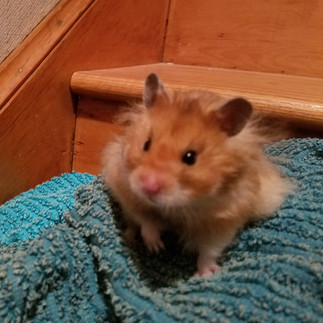What I Learned from My Hamsters
- Natasha Mercado-Santana

- Nov 20, 2025
- 4 min read
The privilege of owning a pet is such a rewarding experience. I truly believe that we as human beings are chronically deprived of nature, and any kind of connection we can make with it is healing for our souls. We can learn a lot from animals, especially when we're living with them. Over the span of seven years, I had three hamsters, and they taught me a lot about life and about myself and what I can handle.
Hamsters are particularly attuned to nature because they were domesticated so recently, less than 100 years ago. That's what I love most about them (besides how cute they are). Having a hamster is essentially like having a tamed wild animal in your home. It's fun to just sit and watch them burrow, forage, and explore their environments. They also do require taming, which takes time, work, and patience, and results in such a rewarding bond. If you've ever wanted the Disney Princess experience of taming and befriending a wild animal, hamsters are a safe way of getting that.
There are over 20 species of hamster, but only five have been domesticated, and the ones that have been are solitary creatures. They don't seek out relationships with other hamsters, let alone with people. Hamsters don't crave human interaction, and once tamed, they only bond with one or two people, so when you know your hamster loves you, it feels really special. That bond was built on mutual trust and respect. That's the biggest lesson I learned from all of my hamsters. I had to do things at their pace, give them space, get to know their individual personalities, and show them that I could be trusted. I also had to learn to trust them.

My first hamster Hamtaro was very friendly and easy to tame. He was also unusually large for a male hamster, so he was easy to pick up if I needed to do so, and I wasn't super worried about him getting lost. Once I trusted him not to run away, I gave him more space to free roam at night, and that actually made our bond grow stronger. We developed a routine where I would open the door to his cage in the evening and let him run around my room, the hallway, and the living room (it also helped that I lived alone at this point and didn't have to worry about anyone else stepping on him) while I filled his food and water, spot cleaned his cage, and relaxed on the couch. When it was time for me to go to bed, he would go right back into his cage for the night. If he didn't want to walk on his own, he'd let me carry him back. This was also the only hamster I've had who would come when I'd call him. It was my meeting his needs of freedom that helped him learn to really trust me.

My hamsters also taught me what it's like to bond with something you can't really communicate with. Dogs and cats have had millions of years to develop ways of communicating with us, but hamsters haven't. I had to take the time to learn their body language cues and how to best care for them. My second hamster Penny had a lot of anxiety and used to bite me. I spent a lot of time trying to get her to relax, and it wasn't until a trip to the vet that I learned she really did trust me, after she attacked the vet and ran back to burrow into my hands. Afterwards, I started paying more attention to her body language and realized that her bites were how she communicated. She was a tiny dwarf hamster who used her teeth to explore the world, especially as she developed cataracts. I had to learn which nibbles meant she was hungry, or wanted me to put her back in her cage, or wanted me to leave her alone. Learning her language was what helped us bond.

Finally, I learned that some legacies are short-lived. With my third hamster Cookie, I took everything I learned from the other two and tried to give him the best life I possibly could. Cookie was the feistiest and sometimes most frustrating hamster I had the pleasure of raising, and he was probably the most spoiled from the beginning because he had a large cage, lots of free roam time, a balanced diet, and a strong bond with me. And his death was the most traumatic. He was perfectly healthy and suddenly developed some kind of skin infection that spread quickly and left him walking around looking like a zombie for the last week or so of his life. It was heartbreaking knowing there was nothing I could do to help him. Hamsters only live an average of one and a half to three years. Many would deem their lives to be insignificant, but I believe it makes their time here more precious.
Raising a tiny animal that doesn't bond easily with humans, is difficult to understand, and lives such a short life is not easy, but it is rewarding. While researching how best to care for my pets, I came across a lot of dangerous misinformation and a frustrating lack of knowledge in general. However, in those seven years, I saw care requirements evolve, better hamster products hit the market, and a worldwide online community of hamster enthusiasts develop. Hamsters have been marketed as an easy first pet, and I could not disagree more. They require so much empathy, patience, and trust, and you're pretty much on your own when it comes to learning how to give them their best life. But these experiences have taught me that I have a lot of determination, care, and compassion.
I am not going to get another hamster any time soon, if ever, but you can see my journey of hamster care at https://www.instagram.com/hamtaro_adventures
.png)









Comments